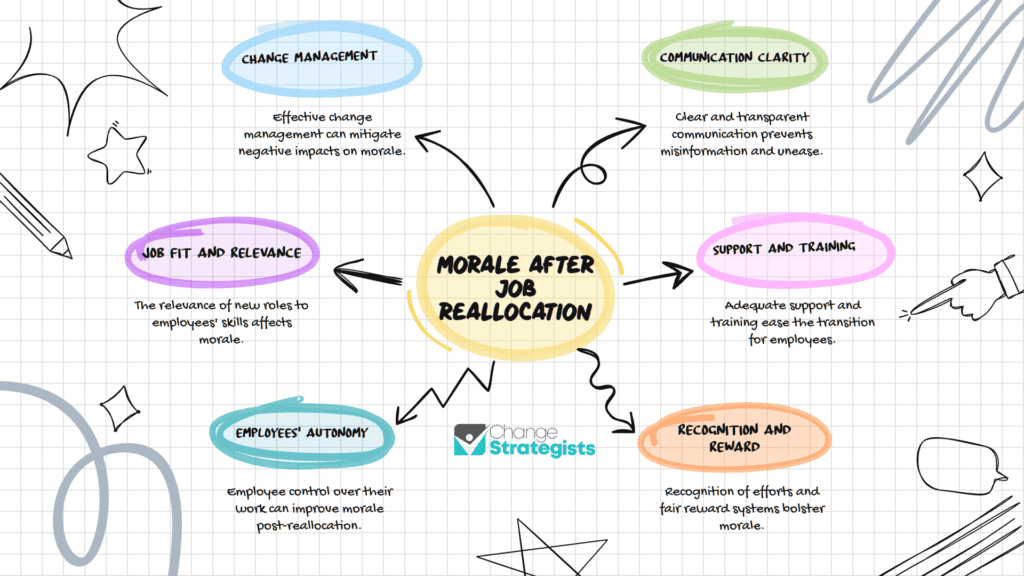When it comes to job redistribution, the ripple effects on employee morale can be profound. Imagine a scenario where your team members suddenly find themselves shouldering new responsibilities or facing the uncertainty of organizational changes.
The impact of such shifts on morale is a delicate balance that can tip the scales of motivation and job satisfaction.
How does this transformation influence the very essence of your team’s engagement and well-being?
Stay tuned to explore the intricate dynamics at play and the strategies that can help navigate these uncharted waters.
Key Takeaways
- Effective communication and support are crucial during job redistribution to maintain morale.
- Training and development opportunities help employees adapt and feel confident in new roles.
- Recognizing and rewarding flexibility and successful adaptation boosts employee morale.
- Clear communication about reasons for redistribution fosters understanding and reduces uncertainty.
Impact of Job Redistribution on Morale
Job redistribution within an organization can greatly influence employee morale, causing shifts in motivation and engagement levels.
When employees are faced with changes in their roles or responsibilities, it’s important for organizations to prioritize effective communication to alleviate feelings of uncertainty and insecurity.
By clearly articulating the reasons behind job redistribution, employees are more likely to understand the purpose and feel supported throughout the alteration process.
Additionally, providing training and support to employees as they adapt to their new positions can greatly improve morale.
Investing in the development of skills needed for the revised roles not only boosts confidence but also demonstrates a commitment to employee growth and success.
Furthermore, recognizing and rewarding employees for their flexibility and contributions during job redistribution is essential for maintaining high levels of motivation.
Acknowledging their efforts reinforces a sense of value and appreciation, fostering a positive work environment conducive to sustained engagement.
Effects of Job Reallocation on Morale
When job roles are reallocated within a team, it can have a notable impact on morale. Employees may face challenges adapting to new responsibilities, leading to increased stress and potentially affecting team dynamics.
Ensuring clear communication and support during the reallocation process is essential for maintaining positive morale levels.
Morale After Reallocation
During times of job reallocation, employees’ morale can vary based on various factors such as perceptions of fairness and adequacy of support.
Proper training and development opportunities play an essential role in ensuring that all employees feel equipped to handle their new roles, thereby positively impacting morale.
Clear communication about the reasons behind job redistribution can help alleviate uncertainty and foster a sense of understanding among the workforce.
Additionally, recognizing and rewarding employees for their successful adaptation to the changes can greatly boost morale after reallocation. Implementing these strategies can aid in maintaining a positive work environment even during times of change.

Team Dynamics Impact
Team dynamics are important factors that greatly impact employee morale during job reallocation processes.
When considering the effects of job reallocation on morale, it’s vital to focus on the dynamics within the team. Here are key points to understand this impact:
- Increased Workload: Unequal distribution of work can lead to some team members feeling overwhelmed, affecting overall team morale.
- Stress and Resentment: Job redistribution often brings stress and can create feelings of resentment among team members, impacting cohesion.
- Lower Morale: Disrupted team dynamics due to changing roles may result in lower morale if not managed effectively.
- Effective Communication and Support: Maintaining open communication and providing support are essential to navigate through job reallocation without severely affecting team morale.
Job Redistribution and Employee Satisfaction
Job redistribution within an organization can greatly impact employee satisfaction levels, particularly with regards to workload distribution and stress management.
When job roles are redistributed without proper support, employees may face an increased workload, leading to feelings of being overwhelmed and stressed.
This can have a direct impact on employee morale and satisfaction within the workplace.
To mitigate these challenges, effective communication about job redistribution plans is essential.
Clear and transparent communication can help alleviate employee concerns and maintain a positive morale during times of change.
Moreover, providing adequate training and resources for employees adapting to new roles post-redistribution is vital for enhancing employee satisfaction.
By offering support in the form of training programs and resources, organizations can empower their employees to navigate through the changes effectively.
This proactive approach not only aids in reducing stress levels but also contributes to overall employee satisfaction and well-being.
Morale Implications of Job Redistribution
When considering the morale implications of job redistribution, you should focus on how it impacts teamwork dynamics within your organization.
Increased stress levels among employees due to changes in workload and responsibilities can greatly affect morale.
Addressing communication challenges during job redistribution is important for maintaining a positive work environment and supporting employee morale.
Impact on Teamwork
During times of job redistribution, the reassignment of tasks can greatly impact the cohesion and effectiveness of team collaboration. Here are four key points to ponder:
- Disruption of Team Dynamics: Job redistribution may disrupt established team dynamics, affecting how employees work together.
- Resentment and Decreased Morale: Unequal distribution of work can lead to resentment among employees, resulting in decreased teamwork morale.
- Communication and Clarity: Lack of clear communication about new roles can impact team cohesion, emphasizing the importance of effective communication during this period.
- Support for Productivity: Providing support and clear expectations during job redistribution can help maintain teamwork morale and productivity levels.
Effective management of job redistribution is essential for maintaining a positive work environment and strong team collaboration.
Stress Levels Affected
Amidst the restructuring of responsibilities within the workplace, heightened stress levels emerge as a significant factor influencing the morale implications of job redistribution.
Job redistribution can result in increased stress levels for employees due to the sudden influx of added responsibilities and workload.
This surge in tasks can lead to feelings of overwhelm and burnout when proper support and training are lacking. The uncertainty surrounding new roles and expectations during job redistribution can also contribute to anxiety, further reducing morale.
Clear communication and guidance are essential during this process to prevent negative impacts on employee morale and job satisfaction.
Addressing stress levels through adequate support, training, and communication is vital in mitigating the morale implications of job redistribution.
Communication Challenges Addressed
Addressing the lack of transparent communication regarding job redistribution is essential to mitigating increased anxiety and uncertainty among employees.
Clear communication channels play a vital role in alleviating morale issues during this process. To effectively address communication challenges, consider the following:
- Regular Updates and Feedback: Providing consistent information and opportunities for employees to share their thoughts can help reduce uncertainty and anxiety.
- Open Dialogue: Encouraging open discussions about job changes can foster a sense of transparency and trust within the team.
- Listening to Employees’ Feedback: Actively listening to concerns and suggestions demonstrates a commitment to valuing employees’ perspectives.
- Mitigating Negative Morale Impacts: Proactively addressing communication challenges can prevent demotivation and disengagement among employees.
Employee Morale in Job Redistribution
In the domain of job redistribution, the fluctuation in roles and responsibilities directly impacts employee morale.
During this period, it is important for companies to focus on strategies that boost employee morale and create a positive culture.
Enhancing employee morale during job redistribution can greatly impact the company’s overall productivity and employee satisfaction levels.
One key aspect to take into account is providing opportunities for employees to learn and grow within their new roles.
Additionally, clear communication about the reasons behind the job redistribution is essential to alleviate uncertainty and insecurity among the staff.
Recognizing and appreciating employees’ efforts as they adapt to their new responsibilities can go a long way in maintaining morale and motivation within the team.
| Boost Employee Morale | Impact the Company’s | Enhance Employee Morale | Create a Positive Culture |
|---|---|---|---|
| Provide training and support | Clear communication about reasons | Recognize and appreciate efforts | Offer growth opportunities |
Job Redistribution Impact on Motivation
During periods of job redistribution, maintaining employee motivation is essential to mitigate decreased morale and dissatisfaction that can arise from additional responsibilities. Here are four key ways in which job redistribution impacts motivation:
- Boost Employee Engagement: Job redistribution done effectively can boost employee engagement by providing new challenges and opportunities for growth.
- Enhance Employee Job Security: Clear communication about the reasons for job redistribution and how it aligns with the organization’s goals can enhance employee job security, reducing anxiety and boosting motivation.
- Create a Positive Culture of Innovation: Involving employees in the decision-making process during job redistribution can create a positive culture of innovation, motivating them to contribute ideas and solutions.
- Recognition of Efforts: Recognizing and acknowledging employees’ efforts during job redistribution can boost employee morale, fostering a sense of appreciation and motivation to perform well despite changes.
Frequently Asked Questions
What Is the Impact on Employee Morale?
Maintaining a balanced workload is vital for employee morale. When communication breaks down, it can lead to burnout. Recognition programs and leadership support are key for preventing burnout and fostering a positive work environment.
How Does Organizational Change Affect Employee Morale?
When organizational change occurs, your morale can be affected by factors like change management, workplace dynamics, communication strategies, leadership styles, employee engagement, conflict resolution, and stress management. Involvement, training, and support can boost morale.
What Is the Relationship Between Staff Morale and Job Performance?
Your staff’s morale strongly influences their job performance. Elevated motivation and work satisfaction enhance productivity and job engagement. Effective communication, job satisfaction, and performance evaluations are key factors in maintaining high morale levels.
How Does Team Building Affect Employee Morale?
You boost morale through team building’s communication exercises, trust-building, problem-solving, collaboration activities, team bonding, and leadership development. Engaging in these activities enhances employee engagement and fosters a sense of belonging, positively impacting morale.
Final Thoughts
To sum up, the impact of job redistribution on employee morale can’t be overstated. The effects of reallocation can lead to heightened stress, decreased satisfaction, and overall unease among employees.
It’s essential for employers to address these moral implications and support their workforce during periods of change.
Remember, maintaining a positive work environment is key to sustaining motivation and productivity, even in the face of extreme job redistribution challenges.





